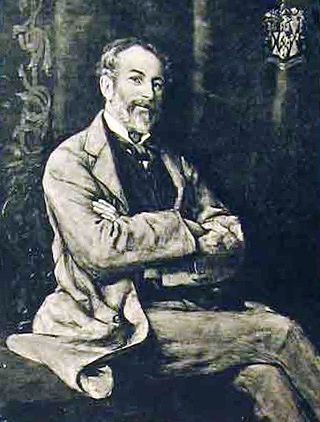Locker-Lampson, Frederick: Mr. Placid udvarol (Mr. Placid’s flirtation in Hungarian)
Mr. Placid’s flirtation (English)Jemima was cross, and I lost my umbrella That day at the tomb of Cecilia Metella. Letters from Rome
Miss Tristram's poulet ended thus: "Nota bene, We meet for croquet in the Aldobrandini." Says my wife, "Then I'll drive, and you'll ride with Selina," (The fair spouse of Jones, of the Via Sistina).
We started—I'll own that my family deem That I'm soft—but I'm not quite so soft as I seem; As we crossed the stones gently the nursemaids said "La! There goes Mrs. Jones with Miss Placid's papa."
Our friends, some of whom may be mentioned anon, Had made rendezvous at the Gate of St. John: That passed, off we spun over turf that's not green there, And soon were all met at the villa—you've been there?
I will try and describe, or I won't, if you please, The cheer that was set for us under the trees: You have read the menu, may you read it again, Champagne, perigord, galantine, and—champagne.
Suffice it to say that, by chance, I was thrust 'Twixt Selina and Brown—to the latter's disgust. Poor Brown, who believes in himself—and, another thing, Whose talk is so bald, but whose cheeks are so—t'other thing.
She sang, her sweet voice filled the gay garden alleys; I jested, but Brown would not smile at my sallies; And Selina remarked that a swell met at Rome, Is not always a swell when one meets him at home.
The luncheon despatched, we adjourned to croquet, A dainty, but difficult sport, in its way. Thus I counsel the Sage, who to play at it stoops,— Belabour thy neighbour, and spoon through thy hoops.
Then we strolled, and discourse found its softest of tones: "How charming were solitude and—Mrs. Jones." "Indeed, Mr. Placid, I doat on these sheeny And shadowy paths of the Aldobrandini."
A girl came with violet posies—and two Soft eyes, like her violets, laden with dew; And a kind of an indolent, fine-lady air, As if she by accident found herself there.
I bought one. Selina was pleased to accept it; She gave me a rose-bud to keep—and I've kept it. Thus the moments flew by, and I think, in my heart, When one vowed one must go, two were loth to depart.
The twilight is near, we no longer can stay; The steeds are remounted, and wheels roll away. The ladies condemn Mrs. Jones, as the phrase is, But vie with each other in chanting my praises.
"He has so much to say," cries the fair Mrs. Legge; "How amusing he was about missing the peg!" "What a beautiful smile!" says the plainest Miss Gunn. All echo, "He's charming! Delightful! What fun!"
This sounds rather nice, and it's perfectly clear it Would have sounded more nice if I'd happened to hear it; The men were less civil, and gave me a rub, So I happened to hear when I went to the Club.
Says Brown, "I shall drop Mr. Placid's society;" But Brown is a prig of improper propriety. "Confound him," says Smith (who from cant's not exempt), "Why, he'll bring immorality into contempt."
Says I (to myself), when I found me alone, "My wife has my heart, is it wholly her own?" And further, says I (to myself), "I'll be shot If I know if Selina adores me or not."
Says Jones, "I've just come from the scavi, at Veii, And I've bought some remarkably fine scarabæi."
|
Mr. Placid udvarol (Hungarian)Jemima dühöngött, s ernyőm elveszett Cecilia Metella sírja megett. Római levelek
Miss Tristram kártyája így zárult: „Ne feledje, várjuk az Aldobrandiniba krokettre." Mire nőm: „Én a hintón, te lovon mégy Selimával" (Jones neje, jó nő a Via Sistinából).
Tudom én, szamárnak itél a családom, mégsem vagyok oly buta, mint néha látszom; ahogy ott kocogunk, egy dajka kiáltja: „Ott megy Mrs. Jones s Miss Placid papája!"
Barátaink – lesz még említve alább pár – vártak ránk a Szent János kapujánál: át rajta, a rétre – a fű ott elaszott rég s a villához értünk. Nem jártál soha ott még?
No várj, ha nem únod, sorban leírom, mi volt ott a fák alatt terítve finom; olvastad az étlapot: nemde ijesztő? pezsgő, borjufilé, majonéz – s újra pezsgő!
Én épp Mrs. Jones s a vén Brown közepett kaptam – az utóbbi bújára – helyet. Ez a Brown, a szegény, hiszi, hogy – no de pszt! Nagy a szája, de még a pofája... no csitt!
Mrs. Jones dala szállt fel betöltve a lombot, én tréfáltam, Brown meg juszt se mosolygott; Selina csacsogta: a római dandyt odahaza nézd meg: ott meg sose rendit.
Aztán kerítők a krokettra a sort, divatos, de eléggé nehéz ez a sport. Imé a tanács, ha ki ráadja fejét: nyársald fel a társad, s kapud el sose vétsd.
Jött a séta, csevely, csupa báj valahány: „Ó mi szép, Mrs. Jones, maga és a magány!" Úgy is van, Placid úr, jó az Aldobrandini árnyas ösvenyein virágillatot színi."
Jött egy lány ibolyákkal, a két szeme mint a virág, amit árult, harmattal telehintve, tartásra könnyed s kész urinő, mint aki véletlen bukkan elő.
Vettem ibolyát, Selinám örömére, s ő egy rózsát adott - őrzöm jó helyre téve. Hamar alkonyodott, s mikor azt mondta, késő, és mennie kell - hiszem, búsult ezért ő.
Cattivo momento! ki maradna tovább? A hintó kígördül, toporog paripád! A hölgyek szapulják Mrs. Jonest, zeng az asztal, hanem engem a legtöbb rajongva magasztal.
„Milyen bölcs!" Mrs. Legge-ből igy ömlik a szó, "s ahogy melléütött, hát az ennivaló!" „Milyen szép, ha mosolyg!" Mrs. Gunn csicsereg, s ők mind: „Elragadó! Cuki! Ó de remek!"
Hízelgő az egész, de úgy lett volna szebb, hogyha hallhatom én is, saját fülüleg; de a férfi tónusa messze keményebb: nosza hallom, amint a klubunkba belépek –
mondja Brown: „Placid úrral én szóba sem állok!" (Brown úr nagykép, sanda morálnok); „Frász belé!", mondja Smith (hipokrita e glossza), „még a végin a züllést is rossz hírbe hozza."
Mondom én (magamban) otthagyva magamra: „Szívem a nejemé – az övé, de szavamra!" S mondom én (magamban): „Már csak egy a hiba: nem tudom, szeret-é avagy sem Selina!"
Mondja Jones: „Most jövök Vejiből, ott a scavi-nál mindenki ilyen szép skarabeust kinál."
|




